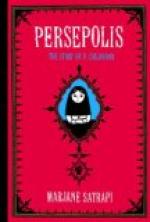Landing on the farther beach, the crowd of waiting Indians fled from them as if frightened, and halted in the darkness beyond the fires. But the Cassekey dragged them on toward a wigwam, taking Mary and the child before the others. “Herein,” says her husband, “was the Wife of the Canibal and some old Women sitting in a Cabbin made of Sticks about a Foot high, and covered with a Matt. He made signs for us to sitt down on the Ground, which we did. The Cassekey’s Wife looking at my Child and having her own Child in her lapp, putt it away to another Woman, and rose upp and would not bee denied, but would have my Child. She took it and suckled it at her Breast, feeling it from Top to Toe, and viewing it with a sad Countenance.”
The starving baby, being thus warmed and fed, stretched its little arms and legs out on the savage breast comfortably and fell into a happy sleep, while its mother sat apart and looked on.
“An Indian did kindly bring to her a Fish upon a Palmetto Leaf and set it down before her; but the Pain and Thoughts within her were so great that she could not eat.”
The rest of the crew having been brought over, the chief set himself to work and speedily had a wigwam built in which mats were spread, and the shipwrecked people, instead of being killed and eaten, went to sleep just as the moon rose, and the Indians began “a Consert of hideous Noises,” whether of welcome or worship they could not tell.
Dickenson and his band remained in this Indian village for several days, endeavoring all the time to escape, in spite of the kind treatment of the chief, who appears to have shared all that he had with them. The Quaker kept a constant, fearful watch, lest there might be death in the pot. When the Cassekey found they were resolved to go, he set out for the wreck, bringing back a boat which was given to them, with butter, sugar, a rundlet of wine, and chocolate; to Mary and the child he also gave everything which he thought would be useful to them. This friend in the wilderness appeared sorry to part with them, but Dickenson was blind both to friendship and sorrow, and obstinately took the direction against which the chief warned him, suspecting treachery, “though we found afterward that his counsell was good.”
Robert Barrow, Mary, and the child, with two sick men, went in a canoe along the coast, keeping the crew in sight, who, with the boy, travelled on foot, sometimes singing as they marched. So they began the long and terrible journey, the later horrors of which I dare not give in the words here set down. The first weeks were painful and disheartening, although they still had food. Their chief discomfort arose from the extreme cold at night and the tortures from the sand-flies and mosquitoes on their exposed bodies, which they tried to remedy by covering themselves with sand, but found sleep impossible.




